2013新人教版英语七年级下Unit4
人教版七年级下册英语unit4知识点+经典练习题

人教版七年级下册英语unit4知识点+经典练习题人教版七年级下册英语unit4 知识点+经典练习题Unit4.Don’t run in the hall way!One:重点词组1.class rules班规;school rules校规;a lot of/lots of rules许多规则;make rules制定规则;follow the rules遵守规则;wear schol uniforms穿校服;wear a hat戴帽子;listen to(the music\the tape)听音乐/听磁带;watch the video/DVD/VCD.观看---;eat in the dinning hall在餐厅吃饭;fight with others与别人打架;run in the hall way在大厅过道跑步;2.arrive late for class上课迟到;be late for class上课迟到;be late for school上学迟到;be quiet安静的;be noisy吵闹的;make the /your bed整理床铺;talk aloud/loudly大声交谈;make much noise大声喧哗;relax yourself放松你自己;3. Too many/too much太多;on school nights在学校的晚上;make dinner做饭;on time准时;Have to---必须,不得不;Two:重点句型1. don’t +v! 请不要---(否定祈使句)(1)Please don’t run in the hall way!请别在大厅过道跑步!(2)Don’t fight with others,please.请不要和别人打架!(3)Don’t make much noise吵杂声at the library!别在图书馆发出吵闹声!(4)Don’t talk aloud/loudly in class!请别在课堂上大声交谈!(5)Don’t listen to music in class!请别在课堂上听音乐!(6)Don’t eat in the classroom,plea se!请别在教室吃东西!(7)Please don’t arrive late for class\school!上学/课请不要迟到!Please don’t be l ate for class/school.(8)Tom,please don’t read in bed!(9)Don’t be noisy!请不要吵闹!(10)Please be quiet!请保持安静!2.-What are the rules?/-We must be on time for class.3.-What are the school rules?有哪些校规啊?-What are the class rules?有哪些班规啊?4.What do you have to do?你一定得做什么啊?5.-Can we (eat in the clsssroom/wear a hat in class)?我们必须---吗?6.-Do you have to get to school before 8am?-Does she have to wear a uniform at school?7(1)There are lots of things to do.There are lots of things you can do.你有许多事情可以做(2)They make rules to help us,we have to follow these rules.(3)You should listen to music to relax yourself.你应当听音乐来放松一下你自己。
2013人教版七年级英语下册units1-12重点短语和句子及范文
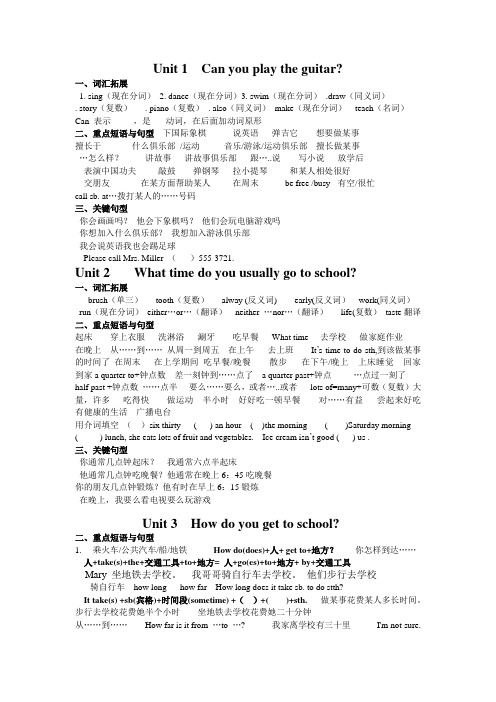
Unit 1 Can you play the guitar?一、词汇拓展1. sing(现在分词)2. dance(现在分词)3. swim(现在分词).draw(同义词). story(复数). piano(复数). also(同义词)make(现在分词)teach(名词)Can 表示- ------,是-----动词,在后面加动词原形二、重点短语与句型下国际象棋说英语弹吉它想要做某事擅长于什么俱乐部/运动音乐/游泳/运动俱乐部擅长做某事…怎么样?讲故事讲故事俱乐部跟…..说写小说放学后表演中国功夫敲鼓弹钢琴拉小提琴和某人相处很好交朋友在某方面帮助某人在周末be free /busy 有空/很忙call sb. at…拨打某人的……号码三、关键句型你会画画吗?他会下象棋吗?他们会玩电脑游戏吗你想加入什么俱乐部?我想加入游泳俱乐部我会说英语我也会踢足球Please call Mrs. Miller ()555-3721.Unit 2 What time do you usually go to school?一、词汇拓展brush(单三)tooth(复数)alway (反义词) early(反义词)work(同义词)run(现在分词)either…or…(翻译)neither …nor…(翻译)life(复数)taste翻译二、重点短语与句型起床穿上衣服洗淋浴涮牙吃早餐What time 去学校做家庭作业在晚上从……到……从周一到周五在上午去上班It’s time to do sth,到该做某事的时间了在周末在上学期间吃早餐/晚餐散步在下午/晚上上床睡觉回家到家a quarter to+钟点数差一刻钟到……点了 a quarter past+钟点…点过一刻了half past +钟点数……点半要么……要么,或者…..或者lots of=many+可数(复数)大量,许多吃得快做运动半小时好好吃一顿早餐对……有益尝起来好吃有健康的生活广播电台用介词填空()six thirty ( ) an hour ( )the morning ( )Saturday morning ( ) lunch, she eats lots of fruit and vegetables. Ice cream isn’t good ( ) us .三、关键句型你通常几点钟起床?我通常六点半起床他通常几点钟吃晚餐?他通常在晚上6:45吃晚餐你的朋友几点钟锻炼?他有时在早上6:15锻炼在晚上,我要么看电视要么玩游戏Unit 3 How do you get to school?二、重点短语与句型1. 乘火车/公共汽车/船/地铁How do(does)+人+ get to+地方?你怎样到达……人+take(s)+the+交通工具+to+地方= 人+go(es)+to+地方+ by+交通工具Mary 坐地铁去学校。
新版(人教版)七年级(下)英语Unit4课文详解

Unit 4 Don’t eat in class.Section A 2a—2d ( P20 )* 教师寄语:No rules, no standards. 没有规矩,不成方圆。
【学习目标】【学习重点】:1、学习掌握本节课的生词和短语;2、巩固祈使句的用法;3、学习情态动词can表示许可的肯定句、否定句、一般疑问句及肯定、否定回答。
4、提高学生的听说能力。
【体验学习】:I、预习交流1. 根据音标拼读单词并牢记;2. 自学课文,勾画出重点和疑惑。
II、翻译官1. eat outside ________________2. wear a hat ___________________3. a lot of ___________________4. be late for class_______________5. 不得不__________________6. 穿校服_____________________7. 保持安静________________【课堂导学】:I、新课呈现Step1 RevisionReview the school rules at P19.Step2 PresentationPresent key sentences in this period.This is a great school, but there are a lot of rules.Can we bring music players to school?And we always have to wear the school uniform.And we also have to be quiet in the library.Step3 ListeningListen and finish 2a and 2b. Check the answers.Step4 Pair workTalk about the rules in 2a.Step5 Role-playRole-play the conversation in 2d.II、合作交流Group work: 分析总结情态动词can的用法,并练习造句。
人教版七年级下英语(unit4)知识点总结全
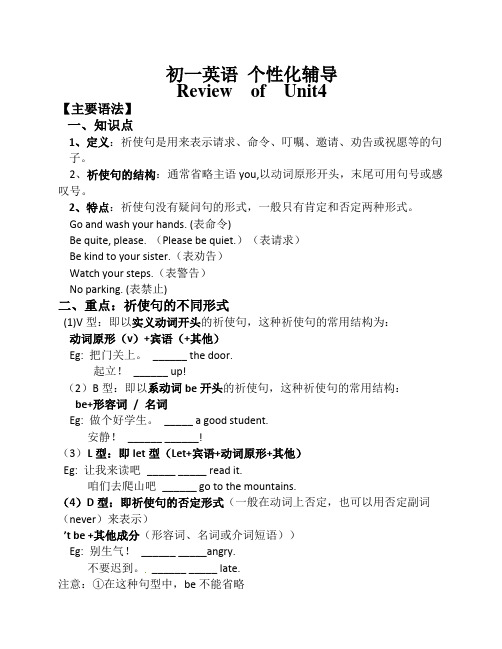
初一英语个性化辅导Review of Unit4【主要语法】一、知识点1、定义:祈使句是用来表示请求、命令、叮嘱、邀请、劝告或祝愿等的句子。
2、祈使句的结构:通常省略主语you,以动词原形开头,末尾可用句号或感叹号。
2、特点:祈使句没有疑问句的形式,一般只有肯定和否定两种形式。
Go and wash your hands. (表命令)Be quite, please.(Please be quiet.)(表请求)Be kind to your sister.(表劝告)Watch your steps.(表警告)No parking. (表禁止)二、重点:祈使句的不同形式(1)V型:即以实义动词开头的祈使句,这种祈使句的常用结构为:动词原形(v)+宾语(+其他)Eg: 把门关上。
______ the door.起立!______ up!(2)B型:即以系动词be开头的祈使句,这种祈使句的常用结构:be+形容词/ 名词Eg: 做个好学生。
_____ a good student.安静!______ ______!(3)L型:即let型(Let+宾语+动词原形+其他)Eg: 让我来读吧_____ _____ read it.咱们去爬山吧______ go to the mountains.(4)D型:即祈使句的否定形式(一般在动词上否定,也可以用否定副词(never)来表示)’t be +其他成分(形容词、名词或介词短语))Eg: 别生气!______ _____angry.不要迟到。
______ _____ late.注意:①在这种句型中,be不能省略②否定副词not不可置于be之后B. Don’t +动词原形+其他Eg: 别在教室里吃东西。
______ ______ in the classroom.别像那样和父母亲讲话______ ______ ______ your parents like that!C. Let引起的祈使句有两种否定形式a. Let+宾语+not+动词原形+其他Let her not do that.Let’s not think about it. It’s only a waste of time.b. Don’t+ let+宾语+动词原形+其他Don’t let Jim do that.Don’t let us go, please.三、难点:1、特殊形式的祈使句(1)在公共场合的提示语中,否定祈使句常用“No+名词/ V-ing形式”结构,表示“禁止做某事”。
新人教版七年级英语下册Unit4第三课时学案

Unit4.第三课时1.课题概说:本节课我们学习阅读有关规则的短文,学会表达对规则的看法与感受2.基础词汇:before在...以前dirty脏的more更多的noisy吵闹的relax放松,休息read阅读terrible可怕的,非常讨厌的kitchen厨房3.必备词组:too many太多的make one’s bed 铺床leave...in the kitchen把...留在厨房read a book看书go to bed 睡觉4.课文鸟瞰:阅读莫莉写给万事通博士的信,在针对莫莉的规则下画线,圈出描述感受的形容词。
Dear Dr. Know,There are too many rules !At 6:00 a.m., my mom says ,“Get up now and make your bed!”After breakfast ,my mom always says,“Don’t leave the dirty dishes in the kitchen!”After that ,I run to schoolbecause I can’t be late .At school ,I have more rules - don’t be noisy, don’t eat in class, ...My dad says I can’t play basketball after school because I must do my homework. I can play only on weekends. After dinner, I can’t relax either .I must read a book before I can watch TV .But I have to go to bed before 10:00 .Rules ,rules ,rules!It’s terrible!What can I do ,Dr. Know ?Molly Brown ,New York【巩固练习1】根据短文内容,回答下列问题。
人教版初中英语七年级下册Unit4SectionB教材全解
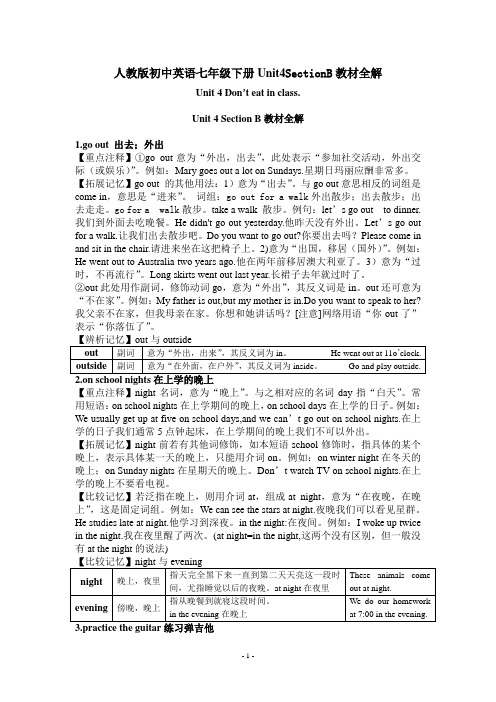
人教版初中英语七年级下册Unit4SectionB教材全解Unit 4 Don’t eat in class.Unit 4 Section B教材全解1.go out 出去;外出【重点注释】①go out意为“外出,出去”,此处表示“参加社交活动,外出交际(或娱乐)”。
例如:Mary goes out a lot on Sundays.星期日玛丽应酬非常多。
【拓展记忆】go out 的其他用法:1)意为“出去”。
与go out意思相反的词组是come in,意思是“进来”。
词组:go out for a walk外出散步;出去散步;出去走走。
go for a walk散步。
take a walk 散步。
例句:let’s go out to dinner.我们到外面去吃晚餐。
He didn't go out yesterday.他昨天没有外出。
Let’s go out for a walk.让我们出去散步吧。
Do you want to go out?你要出去吗?Please come in and sit in the chair.请进来坐在这把椅子上。
2)意为“出国,移居(国外)”。
例如:He went out to Australia two years ago.他在两年前移居澳大利亚了。
3)意为“过时,不再流行”。
Long skirts went out last year.长裙子去年就过时了。
②out此处用作副词,修饰动词go,意为“外出”,其反义词是in。
out还可意为“不在家”。
例如:My father is out,but my mother is in.Do you want to speak to her?我父亲不在家,但我母亲在家。
你想和她讲话吗?[注意]网络用语“你out了”表示“你落伍了”。
【重点注释】night名词,意为“晚上”。
与之相对应的名词day指“白天”。
七年级英语下人教版 Unit4 语法知识详解
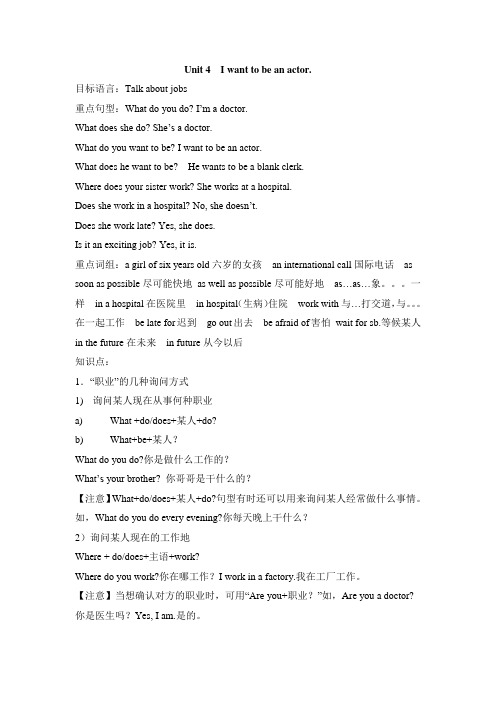
Unit 4 I want to be an actor.目标语言:Talk about jobs重点句型:What do you do? I’m a doctor.What does she do? She’s a doctor.What do you want to be? I want to be an actor.What does he want to be? He wants to be a blank clerk.Where does your sister work? She works at a hospital.Does she work in a hospital? No, she doesn’t.Does she work late? Yes, she does.Is it an exciting job? Yes, it is.重点词组:a girl of six years old六岁的女孩an international call国际电话as soon as possible尽可能快地as well as possible尽可能好地as…as…象。
一样in a hospital在医院里in hospital(生病)住院work with与…打交道,与。
在一起工作be late for迟到go out出去be afraid of害怕wait for sb.等候某人in the future在未来in future从今以后知识点:1.“职业”的几种询问方式1)询问某人现在从事何种职业a)What +do/does+某人+do?b)What+be+某人?What do you do?你是做什么工作的?What’s your brother? 你哥哥是干什么的?【注意】What+do/does+某人+do?句型有时还可以用来询问某人经常做什么事情。
如,What do you do every evening?你每天晚上干什么?2)询问某人现在的工作地Where + do/does+主语+work?Where do you work?你在哪工作?I work in a factory.我在工厂工作。
七年级英语下人教版 Unit4 单元整体说明

单元整体说明单元教材分析本单元的核心话题是询问职业和表达个人意愿,因此询问和表达意愿“asking for and giving personal information”是教学重点。
通过对本单元的学习,学生能掌握本单元出现的职业名称,用于询问和给出个人信息的词组和句型。
单元知识结构单元整体目标:1.Master the vocabulary.2.Master and use: What do you do? I am a teacher. What does he want to do?He wants to be an officer.Does your father work? Yes, he does.What does your mother do?单元教学重难点一览:重点 1.What do you do? I'm a reporter.2.What does your father do? He is a doctor.3.What does she want to be? She wants to be a sales assistant.难点 1.Does he work in hospital? Yes, he does.2.He works in hospital.单元学情分析学生在以前已经学习到动词的第三人称单数,因此在本单元他们可以对出现的第三人称单数运用自如。
不过有些学生也可能出现一些句型变化时的错误,例如,在变一般疑问句的时候,没有把第三人称的单数还原成原型,或者说忘记添加第三人称的单数形式,等等。
这个单元主要是学习有关的一些职业,学生学起来比较有兴趣,借此机会可以问问他们长大后的理想是什么。
让他们明确自己的学习目标,激发他们的学习热情,有助于培养他们的学习信心。
单元教学建议听、说、读、写等技能是相辅相成的,而听读是说和写的基础,因此要充分借助听力材料和补充阅读材料,训练提高学生的听力阅读水平。
人教版2013新目标七年级下册英语单词
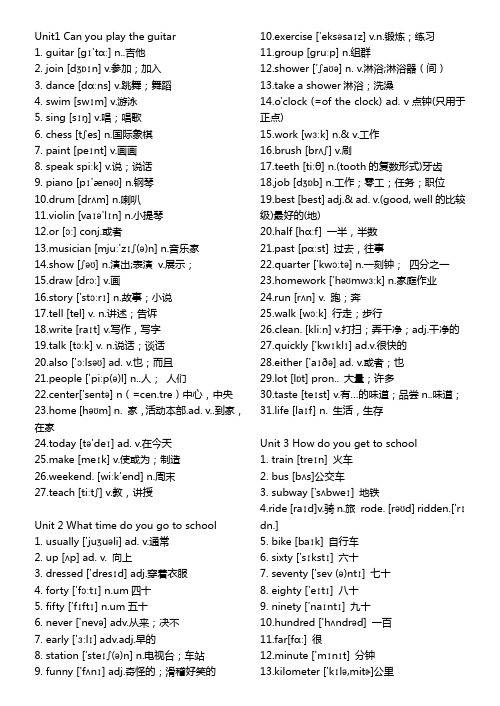
Unit1 Can you play the guitar1. guitar [gɪ'tɑː] n..吉他2. join [dʒɒɪn] v.参加;加入3. dance [dɑːns] v.跳舞;舞蹈4. swim [swɪm] v.游泳5. sing [sɪŋ] v.唱;唱歌6. chess [tʃes] n.国际象棋7. paint [peɪnt] v.画画8. speak spiːk] v.说;说话9. piano [pɪ'ænəʊ] n.钢琴10.drum [drʌm] n.喇叭11.violin [vaɪə'lɪn] n.小提琴12.or [ɔː] conj.或者13.musician [mjuː'zɪʃ(ə)n] n.音乐家14.show [ʃəʊ] n.演出;表演v.展示;15.draw [drɔː] v.画16.story ['stɔːrɪ] n.故事;小说17.tell [tel] v. n.讲述;告诉18.write [raɪt] v.写作,写字19.talk [tɔːk] v. n.说话;谈话20.also ['ɔːlsəʊ] ad. v.也;而且21.people ['piːp(ə)l] n..人;人们22.center['sentə] n(=cen.tre)中心,中央23.home [həʊm] n. 家,活动本部.ad. v..到家,在家24.today [tə'deɪ] ad. v.在今天25.make [meɪk] v.使或为;制造26.weekend. [wiːk'end] n.周末27.teach [tiːtʃ] v.教,讲授Unit 2 What time do you go to school1. usually ['juʒuəli] ad. v.通常2. up [ʌp] ad. v. 向上3. dressed ['dresɪd] adj.穿着衣服4. forty ['fɔːtɪ] n.um四十5. fifty ['fɪftɪ] n.um五十6. never ['nevə] adv.从来;决不7. early ['ɜːlɪ] adv.adj.早的8. station ['steɪʃ(ə)n] n.电视台;车站9. funny ['fʌnɪ] adj.奇怪的;滑稽好笑的10.exercise ['eksəsaɪz] v.n.锻炼;练习11.group [gruːp] n.组群12.shower ['ʃaʊə] n. v.淋浴;淋浴器(间)13.take a shower淋浴;洗澡14.o'clock (=of the clock) ad. v点钟(只用于正点)15.work [wɜːk] n.& v.工作16.brush [brʌʃ] v.刷17.teeth [tiːθ] n.(tooth的复数形式)牙齿18.job [dʒɒb] n.工作;零工;任务;职位19.best [best] adj.& ad. v.(good, well的比较级)最好的(地)20.half [hɑːf] 一半,半数21.past [pɑːst] 过去,往事22.quarter ['kwɔːtə] n.一刻钟;四分之一23.homework ['həʊmwɜːk] n.家庭作业24.run [rʌn] v. 跑;奔25.walk [wɔːk] 行走;步行26.clean. [kliːn] v.打扫;弄干净;adj.干净的27.quickly ['kwɪklɪ] ad.v.很快的28.either ['aɪðə] ad. v.或者;也29.lot [lɒt] pron.. 大量;许多30.taste [teɪst] v.有…的味道;品尝n..味道;31.life [laɪf] n. 生活,生存Unit 3 How do you get to school1. train [treɪn] 火车2. bus [bʌs]公交车3. subway ['sʌbweɪ] 地铁4.ride [raɪd]v.骑n.旅rode. [rəʊd] ridden.['rɪdn.]5. bike [baɪk] 自行车6. sixty ['sɪkstɪ] 六十7. seventy ['sev (ə)ntɪ] 七十8. eighty ['eɪtɪ] 八十9. ninety ['naɪntɪ] 九十10.hundred ['hʌndrəd] 一百11.far[fɑː] 很12.minute ['mɪnɪt] 分钟13.kilometer ['kɪlə,mitɚ]公里14.new [njuː] 新的15.every ['evrɪ] 每一个16.by [baɪ] 通过,被17.drive [draɪv] 开车18.live [lɪv] 活的,生动的19.stop [stɒp] 停止20.cross [krɔs] 交叉21.river ['rɪvə] 河,江22.many ['menɪ]许多23.village [' vɪlɪdʒ] 村庄,村民24.between [bɪ'twiːn] 介于…之间25.bridge [brɪdʒ] 桥26.boat [bəʊt] 小船27.ropeway ['rop,we] n. 索道空中缆索28.year [jɪə] n. 年;年度;岁29.afraid [ə'freɪd] 害怕;惧怕30.like [laɪk] 像;怎么样(介词)31.leave [liː v] 离开;left [left](leave的过去式)32.dream [driːm] 梦想;睡梦33.true[truː] 真的;符合实际的Unit 4 Don’t eat in class1. rule[ruːl] 规则;规章2. arrive [ə'raɪv] 到达3. hallway ['hɔːlweɪ] 走廊;过道4. hall [hɔːl]大万礼堂5. listen ['lɪs(ə)n]听;倾听6. fight [faɪt] 打架;战斗7. sorry ['sɒrɪ]抱歉的;难过的;惋惜的8. outside [aʊt'saɪd] ad. v.在外面adj.外面的9. wear [weə] 穿;戴10.important [ɪm'pɔːt(ə)nt] 重要的11.bring [brɪŋ] 带来;取来12.player ['pleɪə]播放机;运动员13.uniform ['juːnɪfɔːm] 校服;制服14.quiet ['kwaɪət] 安静的15.out [aʊt] 外出16.dish [dɪʃ] 碟;盘dishes ['diʃiz]17.night [naɪt] 晚上18.before [bɪ'fɔː]prep.conj在…以前ad v.以前19.dirty ['dɜːtɪ] 脏的20.kitchen ['kɪtʃɪn] 厨房21.more [mɔː] 更多的22.noisy ['nɒɪzɪ] 吵闹的23.relax [rɪ'læks] 放松;休息24.read [riːd] 读;阅读25.terrible['terɪb(ə)l] 非常讨厌的;可怕的26.feel [fiːl] 感受;觉的27.strict [strɪkt] 严格的;严厉的28.remember [rɪ'membə] 记住;记起29.follow ['fɒləʊ] 遵循;跟随30.luck [lʌk] 幸运;运气31.keep [kiːp] 保持;保留32.hair [heə] 头发;毛发33.learn [lɜːn] 学习;学会Unit 5 What do you like pandas1. tiger ['taɪgə] n.老虎2. elephan.t ['elɪf(ə)n.t] n. 大象3. koala [kəʊ'ɑːlə] n. 树袋熊4. panda ['pændə] n. 熊猫5. lion ['laɪən] n.狮子6. giraffe [dʒə'rɑ:f] n. 长颈鹿7. cute [kjuːt] adj可爱的;机灵的8. lazy ['leɪzɪ] 懒散的;懒惰的9. smart [smɑːt] adj 聪明的10.beautiful ['bjuːtɪfʊl] adj 美丽的;美好的11.scary ['skeərɪ] adj吓人的;恐怖的12.kind [kaɪn.d] n. 种类13.Australia [ɒ'streɪlɪə] n. 澳大利亚14.south [saʊθ] adj 南方的n. 南;南方15.Africa ['æfrɪkə] n.非洲16.pet [pet] n. 宠物17.leg [leg] n. 腿18.cat [kæt] n. 猫19.sleep [sliːp] n.睡觉20.animal ['ænɪm(ə)l] n. 动物21.friendly ['fren(d)lɪ] adj 友好的22.shy [ʃaɪ] adj 羞怯的;腼腆的23.save [seɪv] v. 救;救助24.symbol ['sɪmb(ə)l] n.象征25.flag [flæg]n. 旗;旗帜26.forget [fə'get] v.忘记;旗杆27.place [pleɪs] n. 地点;位置28.water ['wɔːtə] n.水29.danger ['deɪn(d)ʒə] n. 危险30.cut [kʌt] v. 砍;切31.down [daʊn] ad. v.(坐躺倒)下32.tree [triː] n. 树33.kill [kɪl] v.杀死;弄死34.ivory ['aɪv(ə)rɪ] n.象牙35.over ['əʊvə] prep. 超过;多于在… 上方36.zoo [zuː] n.动物园Unit6 I’m watching TV1. newspaper ['n.juːzpeɪpə] n.报纸2. use [juːz] v.使用;运用3. soup [suːp] n.汤4. wash [wɒʃ] v.洗5. movie ['muːvɪ] n.电影6. just [dʒʌst] adv. 只是;恰好7. house [haʊs] n.房子8. drink [drɪŋk] v.喝n..饮料9. tea [tiː] n.茶;茶叶10.tomorrow [tə'mɒrəʊ] ad. v.在明天11.pool [puːl] n.(复数pools)游泳池12.shop [ʃɒp] v.购物13.supermarket ['suːpəmɑːkɪt] n. 超市14.man [mæn] n.男人;人15.host [həʊst] n.主人;东道主16.study ['stʌdɪ] v. n.学习;研究17.state [steɪt] n. 洲18.the United States [ði juˈnaɪtɪd stets]美国;美利坚合众国19.American adj美国的;美洲的n.美国人;美洲人20.dragon ['dræg(ə)n] n.龙21.young [jʌŋ] 幼小的,年轻的22.race [reɪs] 竞赛23.any ['enɪ] 任何一个.任一的24.other ['ʌðə] adj另外的25.children ['tʃɪldrən] n. 儿童26.miss [mɪs] 怀念.思念27.wish [wɪʃ] v. 希望28.delicious [dɪ'lɪʃəs] adj 可口的.美味的29.still [stɪl] ad. v. 还.仍然30.living room ['lɪvɪŋ ru:m] 客厅Unit 7 It's raining!1. rain [reɪn] 下雨;雨水2. windy ['wɪndɪ] 多风的3. cloudy ['klaʊdɪ] 多云的4. sunny ['sʌnɪ] 晴朗的5. snow [snəʊ]下雪;雪6. weather ['weðə] 天气7. cook [kʊk] 做饭8. bad [bæd] 坏的;糟的9. park [pɑːk] 公园10.message ['mesɪdʒ]信息;消息11.take a message捎个口信;传话12.him[hɪm]他(he的宾格)13.could[kʊd] 能;可以14.back [bæk] 回来;回原处15.call(sb)back回电话16.problem ['prɒbləm] 困难;难题17.again [ə'gen; ə'geɪn] 再一次;又一次18.dry [draɪ]干燥的19.cold [kəʊld] 寒冷的;冷的20.hot [hɒt] 热的21.warm [wɔːm] 温暖的22.visit ['vɪzɪt] 拜访;参观23.Canada ['kænədə]加拿大24.summer ['sʌmə] 夏天;夏季25.sit [sɪt] 坐26.juice [dʒuːs] 果汁;饮料27.soon [suːn] 不久;很快28.vacation [və'keɪʃ(ə)n] 假期29.on (a) vacation 度假30.hard [hɑːd]努力地;困难的31.Europe ['jʊrəp] 欧洲32.mountain ['maʊntɪn] 高山33.country ['kʌntrɪ] 国;国家34.skate [skeɪt] 滑冰35.snowy ['snəʊɪ] 下雪的36.winter ['wɪntə] 冬天;冬季37.Russian ['rʌʃ(ə)n]俄国的;俄国人;俄语38.snowman ['snəʊmæn]雪人39.rainy ['reɪnɪ] 阴雨的;多雨的40.Joe [dʒəʊ] 乔41.Jeff [dʒef] 杰夫42.Moscow ['mɔskəʊ] 莫斯科43.Toronto [tə'rɑnto] n. 多伦多44.Boston ['bɔstən] 波士顿Unit 8 Is there a post office near here?1. post [pəʊst] 邮政2. office['ɒfɪs] 办公室3. post office邮局4. police [pə'liːs] 警察5. police station ['steɪʃən] 警察局6. hotel [həʊ'tel] 旅店;酒店7. restaurant ['restrɒnt] 餐馆8. bank [bæŋk] 银行9. hospital ['hɒspɪt(ə)l]医院10.street [striːt] 大街11.pay [peɪ] 付费12.payphone ['peifəun] 付费电话13.near[nɪə] 在……附近14.across [ə'krɒs] 过;穿过15.across from在……对面16.front [frʌnt] 前面17.in front of在……前面18.behind [bɪ'haɪnd] 在……后面19.town [taʊn]镇;市镇20.around [ə'raʊnd] 到处;大约21.north [nɔːθ] 北;北方;北方的22.along [ə'lɒŋ] 沿着23.go along沿着(这条街)走24.turn [tɜːn]转向;翻25.right [raɪt] 向右边;右边26.left [left] 向左边;左边27.rurn right向右.左转28.crossing ['krɒsɪŋ] 十字路口29.neighborhood ['neɪbə,hʊd] 街区;街坊30.spend [spend] 花(时间.钱等)31.spend time花时间32.climb [klaɪm]爬33.road [rəʊd] 路34.often ['ɒf(tə)n] 时常;常常35.air [eə] 空气36.sun shine[sʌn ʃaɪn]阳光37.free [friː]免费的38.enjoy [ɪn'dʒɒɪ] 享受;喜爱39.enjoy reading['riːdɪŋ 'riːdɪŋ] 喜欢阅读40.easily ['iːzɪlɪ] 容易地41.money ['mʌnɪ] 钱Unit 9 What does he look like?1. curly ['kɜːlɪ]卷曲的2. straight [streɪt] 直的3. tall [tɔːl] 高的4. medium ['miːdɪəm] 中等的5. height [haɪt] 身高;高度6. of medium height中等身高7. thin [θɪn] 瘦的8. heavy ['hevɪ] 重的9. build [bɪld] 身材10.of medium build中等身材11.tonight [tə'naɪt] 今夜12.little ['lɪt(ə)l] 小的13.a little一点,少量14.cinema['sɪnɪmə] 电影院15.glasses ['glɑːsɪz] 眼镜ter ['leɪtə] 以后17.handsome ['hæns(ə)m] 英俊的18.actor ['æktə] 演员19.actress['æktrɪs] 女演员20.person ['pɜːs(ə)n]人21.nose [nəʊz] 鼻子22.blonde [blɒnd] adj. 金黄色的23.mouth [maʊθ] 嘴24.round [raʊnd]圆形的25.face [feɪs] 脸26.eye [aɪ] 眼睛27.singer ['sɪŋə(r)] 歌手28.artist ['ɑːtɪst] 艺术家29.crime [kraɪm] 犯罪活动30.criminal ['krɪmɪn(ə)l] 犯罪31.put [pʊt] 放32.each [iːtʃ] 每个,各自33.way [weɪ] 方式,路线34.describe [dɪ'skraɪb] 描述35.differently ['dɪfərəntlɪ] 不同的36.another[ə'nʌðə] 另一,又一37.end [end] 结尾,尽头38.in the end最后39.real [riːl] 真正的40.jeans [dʒinz] 牛仔裤41.Johnny ['dʒɒnɪ] 约翰尼42.Dean [din] 迪安43.Tina ['tinə]蒂娜44.Jackson ['dʒæksn] 杰克逊Unit 10 I'd like some noodles1. noodle ['nuːd(ə)l] 面条2. mutton ['mʌt(ə)n] 羊肉3. beef [biːf] 牛肉4. cabbage [ˈkæbɪdʒ] 卷心菜;洋白菜5. potato [pə'teɪtəʊ] 土豆;马铃薯6. special ['speʃ(ə)l] 特色菜;特价品;特别的;特殊的7. would [wʊd; wəd] (表示意愿)愿意8. would like愿意;喜欢9. yet [jet](常用于否定句或疑问句)还;仍然rge[lɑːdʒ]大号的;大的11.order ['ɔːdə] 点菜;命令12.take one's order点菜13.size [saɪz] 大小;尺码14.bowl[bəʊl] 碗15.one (large) bowl of一(大)碗16.tofu ['təʊfuː] 豆腐17.meat [miːt] (可食用的)肉18.dumpling ['dʌmplɪŋ] 饺子19.porridge ['pɒrɪdʒ] 粥;面糊20.onion ['ʌnjən] 洋葱21.fish [fɪʃ] 鱼;鱼肉22.pancake ['pænkeɪk]烙饼;薄饼23.world [wɜːld] 世界24.around [ə'raʊnd] the world世界各地25.answer ['ɑːnsə] 答案;回答26.different ['dɪf(ə)r(ə)nt]不同的27.cake [keɪk] 蛋糕28.candle ['kænd(ə)l] 蜡烛29.age [eɪdʒ] 年龄30.make a wish [wɪʃ] 许愿31.blow [bləʊ] 吹32.blow out吹灭33.if[ɪf]如果34.will [wɪl] 会35.the UK(等于the United Kingdom)英国35.candy ['kændɪ] 糖果37.lucky['lʌkɪ]幸运的38.popular['pɒpjʊlə]受欢迎的;普遍的39.get popular受欢迎;流行40.cut up[kʌt ʌp]切碎41.idea [aɪ'dɪə] 想法;主意42.bring good luck[lʌk] to…给……带来好运Unit11 How was your school trip?1. milk [mɪlk] 挤奶2. cow[kaʊ] n. 奶牛,母牛3. milk a cow给奶牛挤奶4. horse [hɔːs] 马5. ride [raɪd] a horse骑马6. feed [fiːd] 喂养;饲养7. feed chickens ['tʃɪkɪns] 喂鸡8. farmer ['fɑːmə] 农民;农场主9. quite [kwaɪt] 相当;安全10.quite a lot(of…) 许多11.anything ['enɪθɪŋ] (常用于否定句或疑问句)任何东西;任何事物12.grow [grəʊ] 种植;生长;发育13.farm [fɑːm] 农场;务农;种田14.pick [pɪk] 采;摘15.excellent ['eks(ə)l(ə)nt]极好的;优秀的16.countryside ['kʌntrɪsaɪd] 乡村;农村17.in the countryside在乡下;在农村18.yesterday ['jestədeɪ; -dɪ] 昨天19.flower ['flaʊə] 花20.worry ['wʌrɪ] 担心;担忧21.luckily ['lʌkɪlɪ] 幸运地;好运地22.sun [sʌn] 太阳23.museum [mjuː'zɪəm] 博物馆24.fire ['faɪə] 火灾25.fire station ['steɪʃ(ə)n] 消防站26.painting ['peɪntɪŋ] 油画;绘画27.exciting [ɪk'saɪtɪŋ; ek-]使人兴奋的;令人激动的28.lovely ['lʌvlɪ] 可爱的29.expensive [ɪk'spensɪv; ek-] 昂贵的30.cheap[tʃiːp] 廉价的;便宜的31.slow [sləʊ] 缓慢的;迟缓的32.fast [fɑːst] 快地(的)33.robot ['rəʊbɒt] 机器人34.guide [gaɪd] 导游;向导35.gift [gɪft] 礼物;赠品36.all in all总的说来37.everything ['evrɪθɪŋ] 一切;所有事物38.interested ['ɪnt(ə)rɪstɪd] 感兴趣的39.be interested in对……感兴趣40.dark [dɑːk] 黑暗的;昏暗的41.hear(heard)[hɪə] 听到;听见42.Carol ['kær(ə)l] 卡罗尔Unit12 What did you do last weekend?1. camp [kæmp]扎营2. lake [leɪk] 湖,湖泊3. beach [biːtʃ] 海滩,沙滩4. badminton ['bædmɪnt(ə)n] 羽毛球运动5. sheep [ʃiːp] 羊,绵羊6. as [æz; əz] 作为,当做7. natural['nætʃ(ə)r(ə)l] adj. 自然的8. butterfly ['bʌtəflaɪ]蝴蝶9. tired [taɪəd] 疲倦的10.stay [steɪ] 停留11.stay up late [leɪt] 深夜不留12.away [ə'weɪ] 离开13.run away跑开14.mouse [maʊs] 老鼠15.baby ['beɪbɪ] 幼小的16.shout [ʃaʊt] 呼叫,喊叫17.shout at…冲……大声叫嚷18.woof [wʊf] (狗叫声)汪汪nguage ['læŋgwɪdʒ] 语言20.fly [flaɪ] 飞21.kite [kaɪt] 风筝22.fly a kite放风筝23.high [haɪ] 高的(地)24.high school中学25.ago [ə'gəʊ] 以前26.India ['ɪndɪə] 印度27.tent [tent] 帐篷28.put up搭起,举起29.moon[muːn]月亮30.surprise [sə'praɪz] 惊奇,惊讶31.get a surpris吃惊32.snake [sneɪk] 蛇33.scared [skeəd] 惊慌的34.move [muːv] 移动35.shout to…对……大声喊叫36.start [stɑːt]开始,着手37.jump [dʒʌmp] 跳跃38.up and down上上下下39.wake [weɪk] 弄醒,醒40.into ['ɪntʊ; 'ɪntə] 到……里面41.forest ['fɒrɪst] 森林42.ear [ɪə] 耳朵43.Lucy ['lusi] 露西。
2013春新人教版七年级英语下册全课文翻译
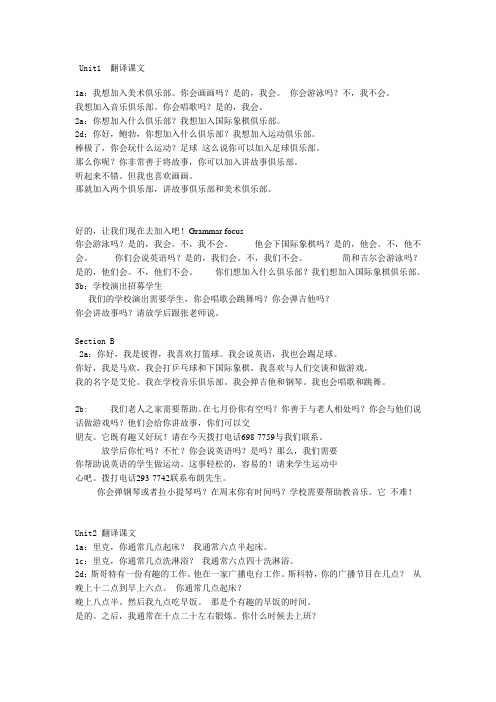
Unit1 翻译课文1a:我想加入美术俱乐部。
你会画画吗?是的,我会。
你会游泳吗?不,我不会。
我想加入音乐俱乐部。
你会唱歌吗?是的,我会。
2a:你想加入什么俱乐部?我想加入国际象棋俱乐部。
2d:你好,鲍勃,你想加入什么俱乐部?我想加入运动俱乐部。
棒极了,你会玩什么运动?足球这么说你可以加入足球俱乐部。
那么你呢?你非常善于将故事,你可以加入讲故事俱乐部。
听起来不错。
但我也喜欢画画。
那就加入两个俱乐部,讲故事俱乐部和美术俱乐部。
好的,让我们现在去加入吧!Grammar focus你会游泳吗?是的,我会。
不,我不会。
他会下国际象棋吗?是的,他会。
不,他不会。
你们会说英语吗?是的,我们会。
不,我们不会。
简和吉尔会游泳吗?是的,他们会。
不,他们不会。
你们想加入什么俱乐部?我们想加入国际象棋俱乐部。
3b:学校演出招募学生我们的学校演出需要学生,你会唱歌会跳舞吗?你会弹吉他吗?你会讲故事吗?请放学后跟张老师说。
Section B2a:你好,我是彼得,我喜欢打篮球。
我会说英语,我也会踢足球。
你好,我是马欢,我会打乒乓球和下国际象棋。
我喜欢与人们交谈和做游戏。
我的名字是艾伦。
我在学校音乐俱乐部。
我会弹吉他和钢琴。
我也会唱歌和跳舞。
2b: 我们老人之家需要帮助。
在七月份你有空吗?你善于与老人相处吗?你会与他们说话做游戏吗?他们会给你讲故事,你们可以交朋友。
它既有趣又好玩!请在今天拨打电话698-7759与我们联系。
放学后你忙吗?不忙?你会说英语吗?是吗?那么,我们需要你帮助说英语的学生做运动。
这事轻松的,容易的!请来学生运动中心吧。
拨打电话293-7742联系布朗先生。
你会弹钢琴或者拉小提琴吗?在周末你有时间吗?学校需要帮助教音乐。
它不难!Unit2 翻译课文1a:里克,你通常几点起床?我通常六点半起床。
1c:里克,你通常几点洗淋浴?我通常六点四十洗淋浴。
2d:斯哥特有一份有趣的工作。
他在一家广播电台工作。
斯科特,你的广播节目在几点?从晚上十二点到早上六点。
新人教版七年级英语下册 Unit 4
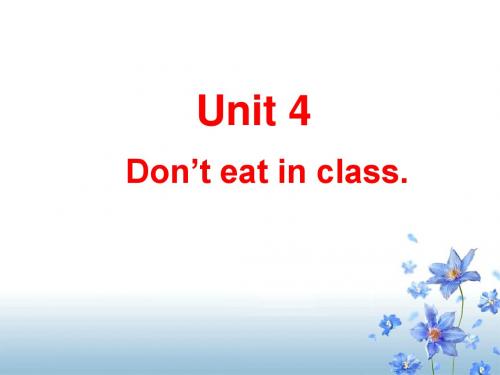
The tall man must be your father. 那个高个子男人一定是你的爸爸。 注意:以must开头的一般疑问句,它的否定 回答用needn’t(不必要),不用mustn’t (不允许),mustn’t常用于否定句中表示 “不允许,禁止”。 ---Must I go there on foot? 我必须得走过去吗? ---No,you needn’t.不,你不需要。 • You mustn’t park your car here. • 你的车不允许停在这儿。
2.你能区别 Ms./Mrs./Miss.吗 • ●Ms.:“女士”,用于婚姻状况不明或不 想区分婚否的女子的姓前。 • ●Mrs.:“夫人”,用于已婚女子姓前。 • Madam:也用于已婚女子,意为“夫人、 女士”,一般单独使用,不与姓连用 • ●Miss.:“小姐”用于未婚女子姓前,还 常用于年轻的女教师的姓前,可译为“老 师”。
翻译:他们什么时候到达这里? When will they reach here? 【典型例题】 D ---What time did the team________the top of the mountain? ---At about 4:30 p.m. A.reach to B.get at C. arrive D.arrive at
too much形容词,“太多”,接不可数名词 I have too much homework today. 今天我有太多的家庭作业 much too副词,“太,非常”,接形容词或副 词 My mother is much too busy. 我的妈妈太忙了 【典型例题】 C I have _______skirts and this one is_______large for me,so you can take it if you like. A. too many; too much B. too much; much too C. too mang; much too
新人教版英语七年级下册Unit4_语法专项课件(祈使句)
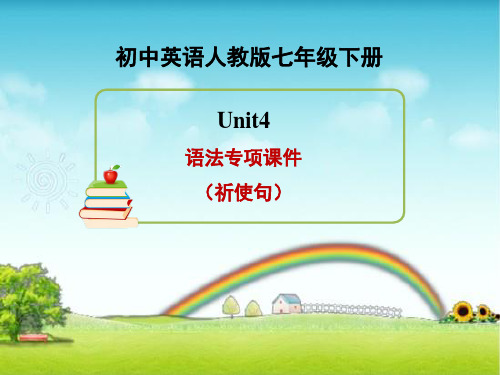
考点大观
易错辨析
通关训练
易错点3
祈使句的答语
以let开头的句式的肯定回答多用Good idea!
否定回答用Sorry,… —Let’s chat on the Internet. —Good idea.
考点大观
易错辨析
通关训练
【典例1】—What are the rules at your school? —Don’t run in the hallways and ______ arrive late for class. A. not to B. won’t C. don’t D. no
考查祈使句。句意:不要吵醒你妹妹,本。她需要
解析
一个好觉。祈使句的否定形式为Don’t+动词原形+其 他,故选A。
考点大观
易错辨析
通关训练
【典例3】—Don’t forget to give my best wishes to your uncle. —______. A. No, I don’t B. No, I won’t
初中英语人教版七年级下册 Unit4
语法专项课件
(祈使句)
语法透析
考点大观 易错辨析
通关训练
考点大观
易错辨析
通关训练
祈使句的定义
祈使句用来表示命令、请求、建议或劝告对 方做某事或别做某事等。 Close the door, please. Be careful! Don't be late for school again!
考点大观
易错辨析
通关训练
易错点3
祈使句的答语
由于祈使句所表达的动作都还是未发生的,
因此对它的应答通常要用“一般将来时”。
2013春新人教版七年级下册英语_unit4单元巩固试卷

Unit 4 Don’t eat in class (100分)班级:姓名:分数:一、单词拼写(20分)1.h_ ll w_ _2.r_p_ w_ _3.i_p_ _t_ n _4.a _ r a_ d5.v _ l_ a_ e6.h _n d_ e_7.m _ n_t_8.d _ e_m9.q _i_t10.b _i_ g 11._n_f_ _m12.a _r_v_13.pr _ct_ c_14.k_ t c_ _n15.t _r r_b_ _16.r _m_ mb_ _17.k_ _p18.l_a_n19.h _i_20.n_i_y二、短语翻译(20分)1. school rules _______________2. arrive late for class _______________3. (be) on time _______________4. 在走廊上__________________5. 在餐厅______________6. 听音乐____________________7.不得不__________________8.保持安静________________9.go out _________________10. practice the guitar __________________11. do the dishes_____________12. help his mom make breakfast__________13. on school nights __________14. every Saturday_____________________15. 放学以后______________16. 在晚上__________________________17.对某人要求严格__________________________18.make your bed___________________19.在周末________________20.好运!_______________三、用单词的适当形式填空(10分)1.You’d better not break the______(rule).2.I _________(not have) do my homework on weekends.3.________ (not fight ) with each other in the classroom.4.The girl often comes back early on s_________ nights.5.No _________(smoke) in public!6.We can eat in the d_________ hall every day7.She________(have) go home at the moment.8.Tom can’t_____(make) breakfast for his family.9.Let us_____(not sing) the Japanese song.10.What _____ your sister ____ to do at night (have)?四、句子翻译(30分)1.我们可以听音乐吗?_______________________?2.不要走廊上追逐!___________________________!3.不要和你哥哥打架。
新人教版七年级英语下Unit 4 教材听力原文及译文
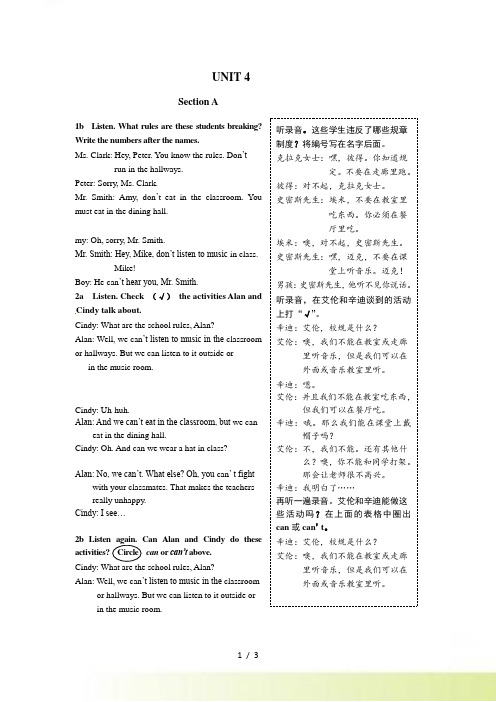
UNIT 4 Section A1b Listen. What rules are these students breaking? Write the numbers after the names.Ms. Clark: Hey, Peter. You know the rules. Don’trun in the hallways.Peter: Sorry, Ms. Clark.Mr. Smith: Amy, don’t eat in the classroom. You must eat in the dining hall.my: Oh, sorry, Mr. Smith.Mr. Smith: Hey, Mike, don’t listen to music in class.Mike!Boy: He can’t hear you, Mr. Smith.2a Listen. Check (√)the activities Alan and Cindy talk about.Cindy: What are the school rules, Alan?Alan: Well, we can’t listen to music in the classroom or hallways. But we can listen to it outside or in the music room.Cindy: Uh-huh.Alan: And we can’t eat in the classroom, but we can eat in the dining hall.Cindy: Oh. And can we wear a hat in class?Alan: No, we can’t. What else? Oh, you can’ t fight with your classmates. That makes the teachersreally unhappy.Cindy: I see…2b Listen again. Can Alan and Cindy do these activities? Circle can or can’t above.Cindy: What are the school rules, Alan?Alan: Well, we can’t listen to music in the classroom or hallways. But we can listen to it outside orin the music room. 听录音。
人教版七年级英语下册Unit 4优秀作业设计案例
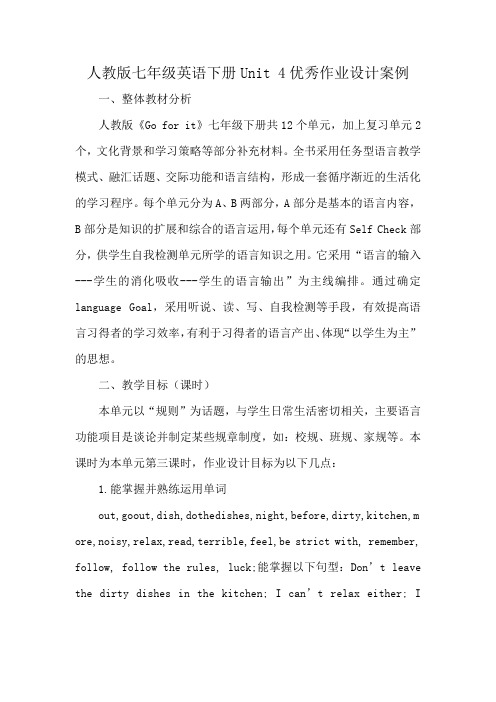
人教版七年级英语下册Unit 4优秀作业设计案例一、整体教材分析人教版《Go for it》七年级下册共12个单元,加上复习单元2个,文化背景和学习策略等部分补充材料。
全书采用任务型语言教学模式、融汇话题、交际功能和语言结构,形成一套循序渐近的生活化的学习程序。
每个单元分为A、B两部分,A部分是基本的语言内容,B部分是知识的扩展和综合的语言运用,每个单元还有Self Check部分,供学生自我检测单元所学的语言知识之用。
它采用“语言的输入---学生的消化吸收---学生的语言输出”为主线编排。
通过确定language Goal,采用听说、读、写、自我检测等手段,有效提高语言习得者的学习效率,有利于习得者的语言产出、体现“以学生为主”的思想。
二、教学目标(课时)本单元以“规则”为话题,与学生日常生活密切相关,主要语言功能项目是谈论并制定某些规章制度,如:校规、班规、家规等。
本课时为本单元第三课时,作业设计目标为以下几点:1.能掌握并熟练运用单词out,goout,dish,dothedishes,night,before,dirty,kitchen,m ore,noisy,relax,read,terrible,feel,be strict with, remember, follow, follow the rules, luck;能掌握以下句型:Don’t leave the dirty dishes in the kitchen; I can’t relax either; Imust read a book before I can watch TV; I have to help mom make breakfast.2.通过进行听力练习,让学生们能练习本节课时所出现的新的表达方式;通过进行阅读练习,学生的细节阅读策略能够得到提升。
3.能用英语表达和制定一些简单的规则,理解“没有规矩不成方圆”;无论是在学校时还是在家里以及以后走上社会都应当遵守规则,按规则办事。
2013-2014学年人教版七年级英语下册单元测评:Unit4_Don’t_eat_in_class(含答案)
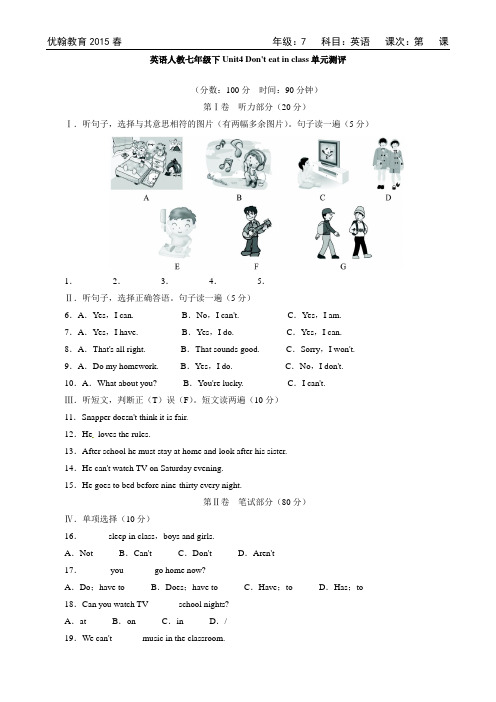
英语人教七年级下Unit4 Don't eat in class单元测评(分数:100分时间:90分钟)第Ⅰ卷听力部分(20分)Ⅰ.听句子,选择与其意思相符的图片(有两幅多余图片)。
句子读一遍(5分)1.______2.______3.______4.______5.______Ⅱ.听句子,选择正确答语。
句子读一遍(5分)6.A.Yes,I can. B.No,I can't. C.Yes,I am. 7.A.Yes,I have. B.Yes,I do. C.Yes,I can. 8.A.That's all right. B.That sounds good. C.Sorry,I won't. 9.A.Do my homework. B.Yes,I do. C.No,I don't. 10.A.What about you? B.You're lucky. C.I can't.Ⅲ.听短文,判断正(T)误(F)。
短文读两遍(10分)11.Snapper doesn't think it is fair.12.He loves the rules.13.After school he must stay at home and look after his sister.14.He can't watch TV on Saturday evening.15.He goes to bed before nine-thirty every night.第Ⅱ卷笔试部分(80分)Ⅳ.单项选择(10分)16.______sleep in class,boys and girls.A.Not B.Can't C.Don't D.Aren't17.______ you ______ go home now?A.Do;have to B.Does;have to C.Have;to D.Has;to 18.Can you watch TV ______ school nights?A.at B.on C.in D./19.We can't ______ music in the classroom.A.hear B.hear to C.listen D.listen to20.Don't talk ______ eat in class.A.and B.or C.so D.but21.Do you have lots of______ to follow in your school?A.friends B.rule C.rules D.a rule22.He's never ______ class.A.arrive B.late for C.arrive late D.late23.He can't ______,but he often ______ to the beach to play.A.swimming;go B.swim;goes C.swims;goes D.swim;go 24.—Mom,can I go skating?—______,but you have to wear a coat.It's cold outside.A.No,you can't B.Yes,please C.Yes,you can D.No,you can 25.I have ______ things to do today,so I'm ______ busy.A.too many;too many B.too many;much tooC.too much;much too D.too much;too manyⅤ.完形填空(10分)My dear kids,here are some__26__for you.As students in our school,you have to follow them. Don't __27__ late for school.You have to be here by eight.Don't eat in the classroom __28__ you can eat in the dining hall.Get back home before six in the afternoon.You can't eat __29__ and you can only eat at school at noon.Don't __30__ with your classmates or other students.You can wear glasses in class.But you can't wear __31__.C lean the __32__ after school.You have to __33__ sports shoes for P.E.class in the __34__.You can't go out on school __35_. It is dangerous to go out at night.Go to the music room if you want to listen to music.Hand in(上交)your homework on time.26.A.opinions B.suggestions C.guides D.rules27.A.fun B.arrive C.return D.walk28.A.or B.so C.but D.and29.A.inside B.beside C.outside D.around30.A.talk B.wash C.stand D.fight31.A.wallet B.sunglasses C.belt D.clothes 32.A.study B.shop C.classroom D.bedroom33.A.wear B.on C.in D.with34.A.gym B.dining hall C.palace D.classroom35.A.morning B.noon C.afternoon D.nightsⅥ.阅读理解(30分)AMany students in the USA always take the school bus to school every day.Parents think taking the school bus is very safe.But sometimes it is also dangerous.Some students died because they broke the school bus rules.Here are some bus rules:Arrive at the bus station early.Wait for the bus at the bus station.Don't play around the bus.Don't run everywhere at the bus station.Don't walk or fight in the bus when it is going.Don't try to leave the bus until it stops.These rules are good for students.Remember them and don't break them.So you can keep yourself safe.根据短文内容,判断句子正(T)误(F)。
人教版英语七年级下UNIT4语法精讲

No smoking!
No photos! No spitting! Danger!
No parking!
No speaking!
祈使句
祈使句:表示命令、请求等,其结构为省去主语 you的简单句 . 1、一般以动词原形开头 2、句末用句号或感叹号 3、为表示客气,句首或句末可加please,please 放在句末时,前要用逗号。 Please listen to me. Listen to me,please. 4、否定式结构在动词原形前加don’t.
Unit 4
'
By Millie
We can’t rule the country without rules.
没有规章制度就不能治理好国家.
keep/follow rules 遵守规则 family rules 家规 break rules 违反规则 school rules 校规 class rules 班规 library rules 图书馆规则 dining rules 就餐规则
can
• 2. 表示许可,相当于may,不如may正式,多用于口语 You can play football here. • 你可以再这儿踢足球。 You can't take the book out of the room. 你不可以将这本书拿出室外。 • 3. 表示请求 Can I use your pen? 我可以用一下你的笔吗?
肯定祈使句 1. Sit down. 2. Come in. 3. Eat at home. 4. Open the door. 5. Write.
否定祈使句 Don’t sit down. Don’t come in . Don’t eat at home.
新人教版七年级英语下册unit4 阅读教学与练习

阅读练习AMy name is Li Nan. I’m Chinese, but I live in the US with my parents now. I’m in a middle school. At school, I have a lot of new friends. They are from different countries. I have breakfast at home. I eat egg and two pieces of bread and drink a glass of milk for breakfast. I have no time to go home at noon. So I have to eat lunch at school. The food is good, but I don’t like it. I don’t like American food. I like supper best. Mom can cook Chinese food in the evening. We eat rice, fish meat, and different vegetables. Sometimes we have noodles and dumplings. Sometimes we go out to eat with our friends.(1) Li Nan studies in an American middle school(2) His parents work in the middle school.(3) The students in the middle school are from different countries.(4) Li Nan doesn’t think American food is good.(5) Li Nan always goes out to eat dumplings with his parents.BIt’s Saturday afternoon, Mr. and Mrs. Green are in a shop. Mrs. Green likes hats very much. Soon she says, “Look, this hat is very nice. Do you think so?”Mr. Green looks at it and says, “Do you call that a hat? It looks like a lighthouse.”“Don’t speak like that,” Mrs. Green says. She puts the hat on and looks at it in the mirror.Mr. Green sits down, but Mrs. Green looks in the mirror for a long time.“You have many hats. Don’t buy this one.” says Mr. Green.“You have many ties. And you bought one this morning,” says Mrs. Green.“A man can never have too much ties!” says Mr. Green.“That a woman can never have too many hats,” says Mrs. Green. Then she buys the hat.(1) What does Mr. Green like?A. HatsB. LighthouseC. TiesD. Mirror(2) Does Mr. Green like the hat?A. Yes, he does.B. No, he can’t.C. Yes, he likes it.D. No, he doesn’t.(3) What does Mr. Green do when Mrs. Green looks at the hat in the mirror?A. He goes to buy another hat.B. He sits down and waits for his wife.C. He goes to buy a tieD. He is angry and goes out.(4) What did Mr. Green do in the morning?A. He bought many ties.B. He bought a hat for his wife.C. He bought a lighthouse.D. He bought a new tie.(5) Which sentence is right?A. Mr. Green doesn’t like the hat because it looks like a house.B. Mrs. Green has many hats at home.C. Mr. Green bought a tie for his wife.D. Mrs. Green doesn’t buy anything in the shop.COne day, Jim says to his mother when they are having breakfast, “I don’t want to go to school.”“Why?”his mother asks. “Oh, no one likes me. Teachers don’t like me, the students don’t like me, and even the gate keeper doesn’t like me.” His mother says, “Perhaps you aren’t kind to them. You should be friendly to them. Try to do that.”“I’m old. I can’t change. I don’t want to go to school.” Jim says.“You must go to school. The school needs you. You’re a headmaster of your school,”his mother says. So Jim has to get his car out and goes to school.(1) Jim is _________ of a school.A. an old studentB. a gate keeperC. a headmasterD. a teacher(2) Jim’s mother is __________ when he says to her.A. doing some cleaningB. eatingC. sweeping the floorD. watching TV(3) Jim doesn’t want to go to school because __________.A. he has to look after his mother at homeB. he wants to go swimmingC. he doesn’t like studyingD. all the people in the school don’t like him(4) Jim ________ to school at last.A. drivesB. ridesC. walksD. runs(5) In the passage we know maybe Jim _____________.A. is a very good manB. is cleverC. isn’t friendly at schoolD. is a kind man参考答案:A. 1-5 T F T F FB. 1-5 C D B D BC. 1-5 C B D A C。
新人教版七年级下册英语 Unit 4 教案
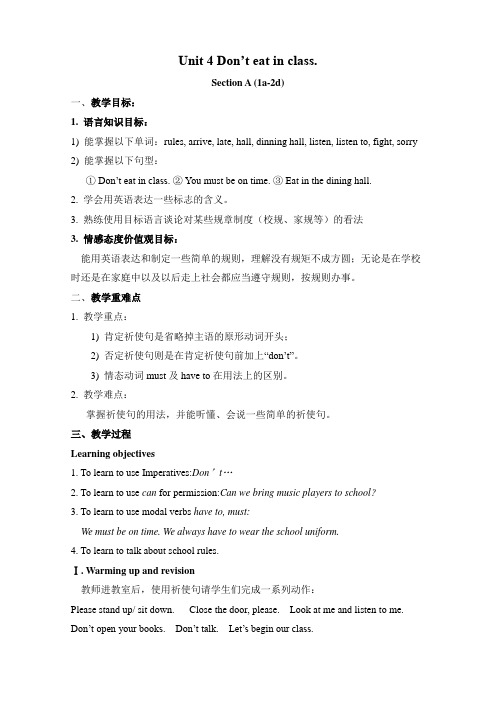
Unit 4 Don’t eat in class.Section A (1a-2d)一、教学目标:1. 语言知识目标:1) 能掌握以下单词:rules, arrive, late, hall, dinning hall, listen, listen to, fight, sorry2) 能掌握以下句型:①Don’t eat in class. ② You must be on time. ③ Eat in the dining hall.2. 学会用英语表达一些标志的含义。
3. 熟练使用目标语言谈论对某些规章制度(校规、家规等)的看法3. 情感态度价值观目标:能用英语表达和制定一些简单的规则,理解没有规矩不成方圆;无论是在学校时还是在家庭中以及以后走上社会都应当遵守规则,按规则办事。
二、教学重难点1. 教学重点:1) 肯定祈使句是省略掉主语的原形动词开头;2) 否定祈使句则是在肯定祈使句前加上“don’t”。
3) 情态动词must及have to在用法上的区别。
2. 教学难点:掌握祈使句的用法,并能听懂、会说一些简单的祈使句。
三、教学过程Learning objectives1. To learn to use Imperatives:Don’t…2. To learn to use can for permission:Can we bring music players to school?3. To learn to use modal verbs have to, must:We must be on time. We always have to wear the school uniform.4. To learn to talk about school rules.Ⅰ. Warming up and revision教师进教室后,使用祈使句请学生们完成一系列动作:Please stand up/ sit down. Close the door, please. Look at me and listen to me. Don’t open your books. Don’t talk. Let’s begin our class.学生听教师的指令完成各种动作,教师也可将指令写到黑板上,让学生从视觉上考察祈使句的特点。
- 1、下载文档前请自行甄别文档内容的完整性,平台不提供额外的编辑、内容补充、找答案等附加服务。
- 2、"仅部分预览"的文档,不可在线预览部分如存在完整性等问题,可反馈申请退款(可完整预览的文档不适用该条件!)。
- 3、如文档侵犯您的权益,请联系客服反馈,我们会尽快为您处理(人工客服工作时间:9:00-18:30)。
Unit 4 Don’t eat in class.【学习目标】【学习重点】:1、初步掌握第19页的生词和句型;2、学习祈使句的用法;3、谈论校规;4. 复习must的用法。
5. 掌握句型:“ I must…” , “ I have to…” , “ I can /can’t…”初识祈使句祈使句表示命令、请求、劝告、征求对方意见等,一般省略主语(you)。
句末用感叹句或句号,用降调朗读。
也可在句前或句末加上please,以使语气更加缓和、客气。
Please come in.(=Come in,please)1.肯定祈使句一般以动词原形开头:Run in the hallways.Be quiet,please.2.祈使句的否定形式一般在动词原形前加_________:___________ run in the hallways. ______be late!3、let开头的句子也是祈使句的一种:Let me help you.让我来帮你。
否定形式是“Don’t +let+宾语+动词原形+其它成分”和“Let+宾语+not+动词原形+其它成分”两种Let’s not stay outside.咱们别待在外面。
Don’t let him go.不要让他走。
提醒:有时,祈使句中的动词或动词词组也可省略。
如:This way,please.(=Come this way,please)有时表示强调,可以在动词原形前加do,表示“一定,务必”的意思如:Do come and help me.务必来帮我。
No加名词或动词-ing 形式可构成否定祈使句,通常用作公共场所的提示语,意为“禁止做某事”No photos!禁止拍照!No parking! 禁止停车!重点知识讲解1, Don’t arrive late for class. 上课不要迟到。
①arrive意为到达,作不及物动词。
arrive in 后接大地方(如城市,国家),arrive at后接小地方(如村庄,车站)②get也可表示“到达”,是不及物动词,后接介词to,再加宾语③reach是及物动词,后面直接可以带宾语后接地点副词时,不加介词in,at,to例We arrive__ the Baiyun Airport five minutes late.A,in B,/ C,at D,onarrive late for...意为“(做)...迟到”,相对于be late for2,Don’t fight.禁止打架。
fight作动词,意为“战斗,打架,争吵”如:She doesn’t want to fight with her mother.她不想和她母亲吵架。
They often fight with other children.他们经常和别的孩子斗殴。
拓展fight against 与...作战,为反对...斗争,fight for为...而战斗(后接表示自由、真理、权利、国家等的名词)We have to fight against difficulties,我们不得不同困难作斗争。
They fight for their country.他们为祖国而战斗。
3,And we always have to wear the school uniform.并且我们必须一直穿着校服。
①have to表示客观的需要或责任,意为“不得不,必须”,后接动词原形。
have to有人称、数、时态的变化,其第三人称单数形式为has to,构成否定句或疑问句时借助助动词do/does.如It’s raining heavily.We have to stay at home.正在下大雨,我们只好待在家里。
Does she have to do any housework at the weekend?周末她们得做家务吗?②must 表示说话人主观上的看法,意为“必须”。
没有人称、时态和数的变化。
You must buy a ticket to go into the cinema.你必须买票进电影院。
You must listen to the teacher in class.课堂上你必须听老师讲课。
提醒have to 的否定式是don’t/doesn’t have to(不必要)must的否定式是must not(一定不能,不允许)如She doesn’t have to do all the homework.她不必做所有的作业。
You mustn’t put your bike here.你不允许把自行车放在这儿。
③Must I...的否定答语是“No,you needn’t.”或“No,you don’t have to.”如Must I clean the classroom now?我现在必须打扫教室吗?No,you needn’t.不,你不必。
4,There are too many rules!有太多的规定了!①too many意为太多,常用来修饰可数名词复数。
如He has too many things in his bags.他包里有太多的东西。
②too much中的too用在much之前,说明“多”的程度,意为“太多”,常用作副词或代词,也可以用作形容词修饰不可数名词如:Is watching TV too much good or bad for your health?电视看得太多对你的健康有益还是有害?③much too中的much用在too之前加强语气,意为“太、非常”,常用在副词或形容词前。
如He drives much too fast.他开车开得太快了。
It is much too cold.天气实在是太冷了。
例I have ___books to read today.A.too manyB.too muchC.much tooD.very much5,But I have to go to bed before 10:00但是我必须在10:00之前上床睡觉。
go to bed 意为“去睡觉”,强调动作。
如:I usually go to bed at ten o’clock.我通常在10点上床睡觉。
提醒:be in bed意为“卧床;睡觉”,强调状态例1 你应该早点上床睡觉。
You should____ ____ ____early.例2 我睡觉的时候别制造噪音。
Don’t make noise when I ____ _____ ____6,...but remember,they make rules to help us. ....但是记住,他们制定规则是为了帮助我们。
①表示记住将要做某事,remember to do sth ; 表示记得曾经做过的事,remember doing sthHe asks me to remember to turn off the light when I go to bed.他叫我睡觉前记得关灯。
I remember posting the letter.我记得把那封信寄出去了。
②remember A to B表示“代A向B问好”如:Please remember me to her.请代我向她问好。
例Please remember _____ a new bike tomorrow.This is old.A.buyB. to buy C .buying D.buys7,...I have to keep my hair short. ...我必须留短发。
keep是动词,意为“保留,保存,保持”,具体用法如下:①keep+形容词,表示保持某种状态You must keep quiet in the library.在图书馆你必须保持安静。
②keep+sb/sth+形容词,表示使某人/某物保持某种状态Mother always keeps the house tidy .妈妈总是让家里保持整洁。
Too much work keeps me busy and tired.太多的工作使我忙碌和疲惫。
③keep+名词/代词+介词短语表示让某人一直待在某地/一直把某物保存在某地Keep him in the room until he gets well.让他待在房间直到病好为止。
④keep sb.doing sth.表示“让某人继续/不断地做某事”He kept me waiting for an hour.他让我等了一个小时⑤keep sb./sth from doing sth表示“阻止(防止)某人/某物做某事”The heavy rain keeps the children from going out to play.孩子们因为大雨不能出去玩。
例How long can I have your dictionary?_____it till next term.A, Hold B,Take C,Return D,Keep8,After school ,I can’t play with my friends or watch TV because I have to do my homework.放学后,我不能和朋友一起玩、看电视,因为我必须做家庭作业。
这是一个否定句,句中的or有以下几种用法:①并列结构中,or通常用于否定句,and用于肯定句。
但有时and也可用于否定句。
请注意其不同特点:There is no air or water on the moon. There is no air and no water on the moon.在否定句中并列的结构用or连接,但含有两个否定词的并列结构实际上被看做是肯定结构,故用and。
②or用于连接并列的单词、词组、短语或句子,表示“或者”的意思We can visit the World Park or travel around the world.我们可以参观世界公园,或者周游全世界。
③or用在选择疑问句中,灵活译为“还是”Is that an apple or an orange ?那是苹果还是桔子?④or用于连接两个并列的句子,表示“否则,要不然”的意思Hurry up,or you’ll be late.快点,否则你要迟到啦。
例She can’t speak English ___ French.A,a lot B, and C,or D,no翻译school rules _______________ arrive late for class _______________ (be) on time _______________in the hallways _____________ 在餐厅_____________ 听音乐____________________eat outside ______________ wear a hat _________________ a lot of ___________________be late for class_____________ 不得不__________________ 穿校服_____________________ 保持安静_______________ keep my hair short ___________ relax on weekends __________ learn to play the piano_________ read a book________________ have fun ___________________在家_____________________ be on time for class_____________in class____________________ wear a uniform ________________梦想的学校____________ 不必______________________go out _________________ practice the guitar __________________do the dishes_____________ help his mom make breakfast_______ on school nights ______ every Saturday____________ 放学以后______________ 在晚上__________________________单选()1. If you arrive late _______ class, you must say _______ to your teacher.A. for, thanksB. for, sorryC. to, sorry()2. — Can you sing in the classroom?— _________________A. Yes, you can.B. No, I can.C. Yes, we can.()3. Don’t arrive late. You must be ________ time.A. toB. onC. at()4. Please listen _______ the teacher carefully (认真地).A. toB. onC. at()5. Don’t _______ TV after class.A. watchB. watchesC. watching( )6. —What are the school rules?—We _______ listen to music in class.A. don’tB. can’tC. aren’t( )7. Don’t________ class.A. be lateB. late forC. be late for( )8. There are ________ rules in our school.A. a lots ofB. a lot ofC. lot of()9. I have to _______ the room every morning.A. cleanB. cleansC. cleaning()10. — Does she have to go to bed at 9:00?— Yes, she__________.A. hasB. haveC. does()11. Don’t listen music in the classroom hallways.A. to; andB. to; orC. at; or()12. She lost her bike. She _______ walk to school.A. have toB. has toC. has()13. We ________to wear the school uniform every day.A. not haveB. have notC. don’t have()14. Gina often helps her mother ________the dishes.A. doB. doesC. doing()15.—_________you have to wear a hat today? —No, we don’t.A. AreB. CanC. Do()16. We don’t know Jack _____ Bruce.A. andB. orC. about()17. I can’t relax_______.A. tooB. alsoC. either()18. There are too many ________ in the kitchen.A. vegetablesB. milkC. rice()19. On school nights, I have to go to bed________ 9:00.A. onB. inC. before( )20. —Can we speak Chinese? — _______.A. Yes, you canB. OK, you speakC. No, you don’t( )21. — _________. Your father is sleeping in the room.— Oh, sorry.A. Not talkB. Not talkingC. No talking( ) 22. Don’t eat ________class.A. atB. inC. to选择相应的短语补全对话A:We have a lot of rules in our school.B:____1_____A:Don’t eat in the classroom. Don’t run in the hallways. Don’t listen to music in the classroom._____2____B:_____3_____A:We can eat in the dining hall, but we can’t eat in the classroom. B:Can we wear hats in school?A:_____4_____B:_____5_____A:No, we don’t have to.B:Oh, there are too many rules. A. No, we can’t.B. Do we have to wear uniforms?C. Can we eat in school?D. Don’t arrive late for school.E. What are the rules?I( )1. Don’t be late for class next time, Helen.( )2. What are some of the rules?( )3. Can we listen to music in the classroom?( )4. Let’s have some bananas!( )5. Does he have to go now?“译”展身手 Linda is an American girl. She is a good student. Every morning she gets up at 6:00. She has breakfast at home. ( 1 ) Then she wears her uniform and goes to school. She studies hard every day. ( 2 )她在餐厅吃中饭when she is at school. After school, ( 3 )she does her homework first, and then she cleans the room and ( 4 )帮助她妈妈做晚饭. Before she goes to bed, she usually reads some books. Then at 10:00p.m. she goes to bed. ( 5 )She thinks she is happy every day. What do you think?( 1 )( 2 )( 3 )( 4 )( 5 )阅读下面的短文,选择正确的答案。
